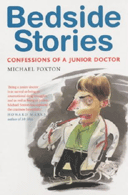
Bedside Stories
by Michael Foxton
224pp, Guardian Books, £7.99
Bedside Stories is Michael Foxton's account of his years as a junior hospital doctor. These are the toughest of a doctor's life - the hours are long, sleep deprivation is the norm, and the work oscillates between grinding attrition and frank terror.
The book is based on Foxton's G2 column, written at regular intervals from the day he first stepped on to the wards. Patients, relatives and colleagues constitute the raw material. A man is admitted having fractured his penis during vigorous intercourse. A bunch of abusive relatives litigiously video Foxton as they grill him about their mother's condition. A woman who has waited eight hours to have her sprained ankle looked at physically prevents Foxton from deserting her cubicle when a lifeless baby is rushed into casualty.
Foxton manages to draw black comedy out of the most appalling anecdote, and Bedside Stories is often extremely funny. Beneath the humour a more sobering picture emerges. Newly qualified at the beginning of the book, Foxton is overwhelmed: "I feel lost and alone and afraid and incompetent and out of my depth and universally despised." Months later he is perturbed by the hardening of his attitude: "I am gradually, regrettably, ceasing to care."
As exhaustion mounts, so does his sense of persecution: patients are "wild animals" who are "sent to punish us" and "you have to learn not to give a shit". His reactions are typical, if rarely voiced - these are common protective adaptations that serve, as Foxton notes, "to stave off the powerful inner drive towards self-pity and resentment of the NHS and how it has ruined my life". Also typical are Foxton's ability to conceal these emotions behind an attentive bedside manner, and his helpless addiction to the lifestyle that threatens to destroy him - the buzz derived from coping with a welter of critically ill patients throughout a never-ending night on call.
Happily, Foxton survived his junior doctor years, and entered a postgraduate career as a psychiatrist. As his working conditions improved he regained his empathy and capacity to care. Two doctors with whom he was acquainted ended their lives a year after qualifying. Many doctors know colleagues who have committed suicide. Foxton's advice to others feeling similarly desperate - "Don't kill yourself. Leave your job. Reclaim your life" - has been handed out by at least one medical school to graduates about to enter the fray.
When it was published in 1978, Samuel Shem's novel The House of God exposed the darker side of life as an American junior doctor. Foxton's contribution shows how little has changed on this side of the Atlantic 25 years later. Some may be tempted to shoot the messenger, but Foxton (a pseudonym) is merely honest about the trauma the NHS inflicts on its young doctors. Measures to reduce hours and improve support are being implemented, which means that Bedside Stories may become a scarcely believable account of the bad old days. Sadly, for this year's medical graduates, it is an all too representative picture of what it is currently like.
· Phil Whitaker is a writer and doctor. His latest novel, The Face, is published by Atlantic.

